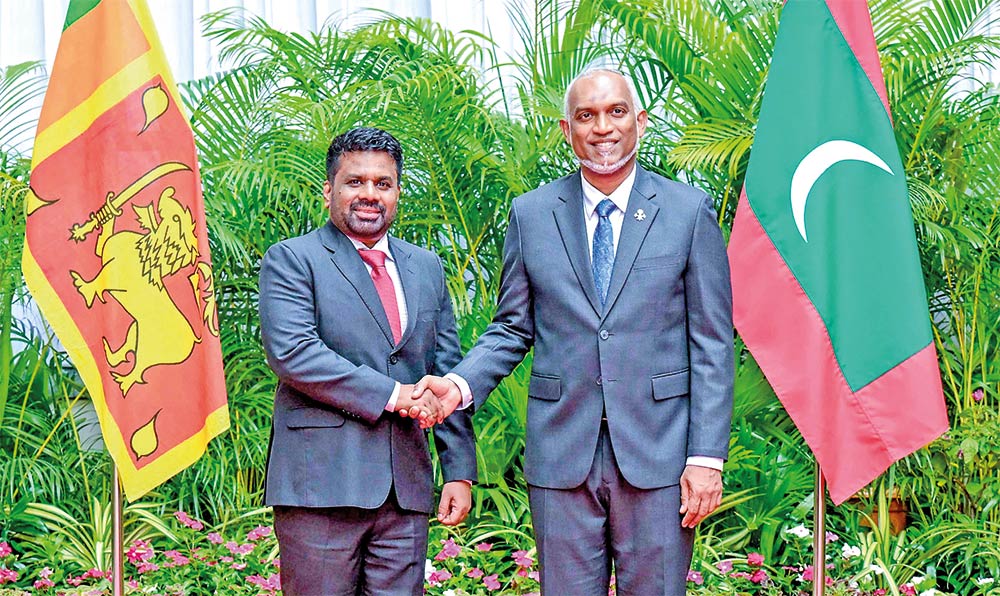Thursday Feb 19, 2026
Thursday Feb 19, 2026
Tuesday, 29 July 2025 04:42 - - {{hitsCtrl.values.hits}}

President Anura Kumara Disanayake yesterday said Sri Lanka is seeking to elevate its economic partnership with the Maldives, with a focus on trade, investment, tourism, fisheries, and renewable energy, during his first official State visit to Malé.
The visit, which coincides with the 60th anniversary of the establishment of formal diplomatic relations between the two Indian Ocean neighbours, underscored the growing importance of economic diplomacy in the region as both countries look to build post-crisis resilience.
Following bilateral talks with Maldivian President Dr. Mohamed Muizzu, President Disanayake highlighted a shared commitment to “diversifying the economic relationship” and welcomed greater Maldivian investment in Sri Lanka.
“Maldivian investors can always look at Sri Lanka as a trusted destination,” Disanayake said, adding that the country is actively developing a single-window system to streamline foreign investment.
He also pointed to Sri Lanka’s investor-friendly Technology Parks and sector-specific industrial zones as new avenues for Maldivian capital.
The President invited Maldivian businesspersons to invest in key growth sectors such as Information Technology and Artificial Intelligence (IT/AI), fisheries and agro-processing, tourism and leisure, real estate, and urban infrastructure.
In addition, trade and tourism were central to the economic discussions. While the Maldives is already a popular destination for Sri Lankan workers, both leaders agreed to further enhance bilateral air connectivity and explore new avenues in tourism collaboration, given its role as a major foreign exchange earner for both economies.
Disanayake also proposed enhanced cooperation in the fisheries and ocean economy, particularly in areas such as sustainable fishing practices and access to transit routes for Sri Lankan fishing vessels en route to the Arabian Sea. With both nations depending heavily on maritime resources, ocean-based cooperation was described as a “mutual economic imperative.”
Renewable energy was another major focus. The President reiterated Sri Lanka’s target to generate 70% of its electricity from renewables by 2030 and proposed partnerships with the Maldives in this area. He also outlined the country’s broader sustainability agenda under the ‘Clean Sri Lanka’ program, which parallels the Maldives’ solid waste management initiative.
Education and employment ties were acknowledged as longstanding economic contributors. “Thousands of Sri Lankans work in the Maldives, contributing to its economy, while Maldivian expatriates and students benefit from Sri Lanka’s professional and academic services,” Disanayake added.
With plans to address a business forum and engage with the Sri Lankan community in the Maldives during the visit, President Disanayake underscored his commitment to advancing not just diplomacy, but tangible economic cooperation.